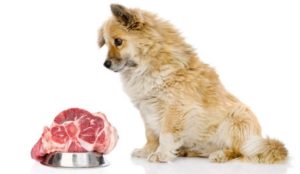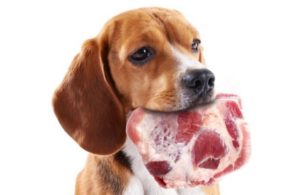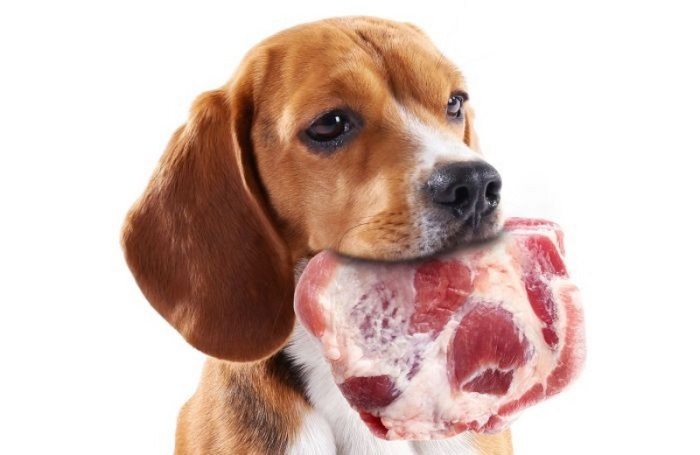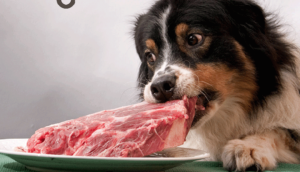Introduction
The debate over whether dogs should eat raw meat has been going on for centuries. Some people believe that it is the most natural diet for dogs, while others believe that it is dangerous and can lead to health problems. In recent years, the popularity of raw meat diets for dogs has been growing, and many pet owners are wondering if this is the right choice for their furry friends. This article will explore the benefits and risks of feeding dogs raw meat, as well as provide some tips on how to safely feed your dog a raw meat diet.

What are the benefits of feeding dogs raw meat?
Good for teeth
One of the main benefits of feeding dogs raw meat is that it helps to clean their teeth and gums. The chewing action of eating raw meat helps to remove plaque and tartar, which can lead to dental issues such as gum disease and tooth decay. Additionally, the enzymes in raw meat help to kill bacteria in the mouth, promoting better oral hygiene for your dog.
In contrast, commercial dog food often contains carbohydrates and sugars that can stick to the teeth and contribute to plaque buildup. This can lead to bad breath, tooth decay, and other dental problems. By feeding your dog raw meat, you are providing them with a natural way to keep their teeth clean and healthy.
Feces
Another benefit of feeding dogs raw meat is that it can lead to smaller, firmer stools. This is because raw meat is more digestible than processed dog food, which often contains fillers and additives that can be difficult for dogs to digest. As a result, there is less waste produced by dogs who eat a raw meat diet, leading to smaller and easier to clean up stools.
Additionally, the high moisture content in raw meat can also contribute to healthier bowel movements for dogs. Adequate hydration is important for maintaining good digestive health, and raw meat provides a natural source of hydration for dogs.
No additives
Raw meat does not contain any additives, such as preservatives, colors, or flavors. This can be beneficial for dogs who are allergic to or sensitive to certain ingredients commonly found in commercial dog food. By feeding your dog a raw meat diet, you have more control over what they are consuming and can avoid potential allergens or irritants.
Moreover, some additives in commercial dog food have been linked to health issues such as allergies, skin problems, and even cancer. By eliminating these additives from your dog’s diet, you may be able to prevent or alleviate these health concerns.
Supports the digestive system
Raw meat is a good source of probiotics, which are beneficial bacteria that help to support the digestive system. These probiotics can help to maintain a healthy balance of gut flora, leading to better digestion and absorption of nutrients. This is especially important for dogs with sensitive stomachs or digestive issues.
Furthermore, the natural enzymes in raw meat can also aid in digestion and promote a healthy gut. This can be particularly beneficial for older dogs who may have a harder time digesting processed foods.
Should dogs eat raw meat or not?

While there are many potential benefits to feeding dogs raw meat, it is important to consider the risks as well. Some of the potential risks include:
- Bacterial contamination: Raw meat can contain harmful bacteria such as Salmonella and E. coli, which can cause food poisoning in both humans and dogs. While dogs have a stronger immune system than humans, they can still get sick from these bacteria.
- Nutritional imbalances: It can be challenging to ensure that your dog is getting all the necessary nutrients from a raw meat diet. Dogs require a balanced diet with the right amount of protein, fat, carbohydrates, vitamins, and minerals. Without proper planning and supplementation, a raw meat diet may not provide all the necessary nutrients for your dog’s health.
- Choking hazards: Raw meat can contain bones, which can pose a choking hazard for dogs. Cooked bones are especially dangerous as they can splinter and cause internal damage. While some raw diets include ground bone, it is important to consult with a veterinarian or a professional before incorporating bones into your dog’s diet.
It is essential to do thorough research and consult with a veterinarian before deciding to feed your dog a raw meat diet. Every dog is different, and what works for one may not work for another. It is crucial to consider your dog’s age, breed, health conditions, and individual needs before making any dietary changes.
How to safely feed dogs meat?
If you have decided to feed your dog a raw meat diet, there are some important safety precautions to keep in mind:
- Consult with a veterinarian: Before starting a raw meat diet, it is crucial to consult with a veterinarian who is knowledgeable about canine nutrition. They can help you create a balanced and safe meal plan for your dog based on their individual needs.
- Choose high-quality meat: It is essential to choose high-quality meat from a reputable source. Look for human-grade meat that is free from hormones, antibiotics, and other additives. Avoid using meat that has been sitting out for too long or has an unusual smell.
- Handle and store meat properly: Raw meat should be handled and stored carefully to prevent contamination. Always wash your hands after handling raw meat, and use separate cutting boards and utensils for preparing your dog’s food. Raw meat should also be stored in the refrigerator or freezer to prevent bacterial growth.
- Gradually introduce new foods: When transitioning your dog to a raw meat diet, it is best to do it gradually. Start by mixing small amounts of raw meat with their regular food and slowly increase the ratio over time. This will give your dog’s digestive system time to adjust and prevent any stomach upset.
- Monitor your dog’s health: It is essential to monitor your dog’s health closely when starting a raw meat diet. Look for any changes in their behavior, appetite, or stool. If you notice any concerning symptoms, consult with your veterinarian immediately.
Conclusion
In conclusion, the debate over whether dogs should eat raw meat is ongoing, and there are valid arguments on both sides. While there are potential benefits to feeding dogs raw meat, it is crucial to consider the risks and take necessary precautions to ensure your dog’s safety and well-being. Consulting with a veterinarian and doing thorough research is key to making an informed decision about your dog’s diet.
Ultimately, every dog is different, and what works for one may not work for another. It is important to pay attention to your dog’s individual needs and make dietary choices that are best for them. Whether you choose to feed your dog a raw meat diet or stick to commercial dog food, the most important thing is to provide them with a balanced and nutritious diet to support their overall health and happiness.

